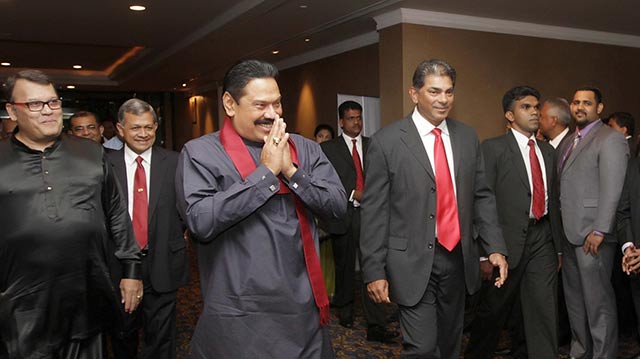
Support justice-driven, accurate and transparent news — make a quick donation to Truthout today!
Also see: “Squatters in Our Own Cities”: The Displacement of Sri Lanka’s Populations
The historic Sri Lanka elections in January that brought a win to political insider turned underdog Maithripala Sirisena have been a political tsunami for the previous administration of Mahinda Rajapaksa. Rajapaksa attempted to pull what many view as a coup d’état by asking the military to intervene when it became evident that the numbers would hand an election victory to his opponent. The military decided that it was ultimately in its interest to stay away from the political fight and let history take its democratic course.
Shortly after Mahinda Rajapaksa’s defeat, his two brothers Basil and Gotabaya Rajapaksa, both US citizens, hastily left the island. Both were closely involved in their brother’s administration – making the country look like a family enterprise. Gotabaya was de facto the second strongest person on the island as head of the Ministry of Defense – giving him huge political, military and economic power – while Basil was head of the Ministry of Economic Development.
Right after the election, President Sirisena announced an ambitious 100-day program, which, among other points, included pledges to prosecute corrupt public officials. To that effect, Basil Rajapaksa was asked to return to Sri Lanka to testify in connection with an ongoing investigation by the country’s Financial Crimes Investigation Division of Police. Shortly after his return on April 21 and testimony, he was arrested along with two other senior officials who worked with him.
The ongoing saga of accountability in Sri Lanka has also spilled well beyond its borders as the money trail is now being followed to the United States. During an open session of Sri Lanka’s Parliament in February, MP Anura Kumara Dissanayake asked Foreign Affairs Deputy Minister Ajith Perera about payments to US entities that were discovered in the course of an audit. It came to light that the Rajapaksa administration had obtained the services of four US companies during the past five years in “building a positive image of this country in foreign countries.”
Admittedly upholding any kind of positive image was a herculean task in light of allegations of horrific human rights violations, political repression and ongoing political interference with the UN report on war crimes that still has not been published. The Rajapaksa family had a history of paying for media and consulting fees to outside political media players. According to a 2011 article in The Independent, the British PR firm Bell Pottinger wrote President Rajapaksa’s speech to the UN upon the conclusion of the civil war. In the speech, he not only denied any wrongdoing or war crimes, but he characterized the role of the Sri Lankan army as “humanitarian” despite documented atrocities that in the last weeks of the war took 40,000 lives. The PR firm was at the time paid $4.7 million of Sri Lankan taxpayer money.
In response to questions from Truthout, Bell Pottinger said in a statement: “We have not worked for the Sri Lankan Government since buying our company, in a management buy-out (MBO), almost three years ago. So the current management team, have had no involvement with the government.”
In the United States, there has been a significant amount of money spent on Washington, DC-based and US Congress-connected lobbying and PR firms.
In addition to continuing scandals coming to light as deals signed by the previous administration are now being closely examined, what emerges is the extent of the paranoia represented in Rajapaksa’s worldview. The obsession with management of foreign public opinion that was brought to light by the inquiry is reflected in vast amounts of money spent on PR and even getting US lobbyists to influence US lawmakers on softening the official US stance on alleged war crimes and human rights abuses.
Companies such as the politically connected Patton Boggs, Cranford Johnson Robinson, Majority Group, and even ex-Miami Herald and ex-Chicago Tribune reporter Steve Hedges got to share a total of $1,278,106. (All but Steve Hedges did not return Truthout’s emails and phone calls requesting comment.)
In a brief conversation with Truthout, Hedges confirmed that he “was personally hired by SL Ambassador to US, Jaliya Wikckramasuriya” (Rajapaksa’s relative). “I was hired for some media relations, press releases and business development work and your questions should be referred to SL Embassy in Washington,” Hedges said. Other emailed questions about Sri Lanka’s PR spending sent to the country’s embassy and the Ministry of Foreign Affairs were not answered.
After 25 years of civil war, Sri Lanka is a country of enormous needs. In the most recent available statistics for 2012, it received $489 million in assistance, including $83 million in humanitarian aid. In a country where an ordinary family’s budget is under $300 per month, the money spent on PR hacks and consultants is literally taking the food off the table for many. It amounts to trickle-up economics from one of the world’s poorest countries to the parasitic Beltway class that feeds on them.
Media that fights fascism
Truthout is funded almost entirely by readers — that’s why we can speak truth to power and cut against the mainstream narrative. But independent journalists at Truthout face mounting political repression under Trump.
We rely on your support to survive McCarthyist censorship. Please make a tax-deductible one-time or monthly donation.